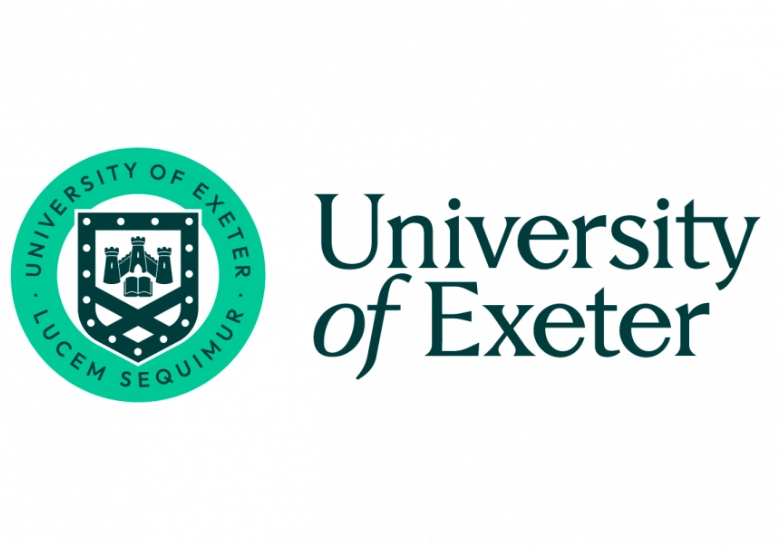University of Exeter
The University of Exeter is a leading Russell Group university located in the cathedral city of Exeter (Devon) and the stunning seaside location of Penryn (Cornwall) in the beautiful Southwest of England.
Boasting award-winning green campuses, an excellent quality of life and outstanding, globally-recognised quality of teaching and research, the University of Exeter has seen its student population grow to over 30,000 students in recent years, with over 20% of students coming from outside the UK. The University received its Royal Charter in 1955, though its origins date to the mid-19th Century.
STUDY AT THE UNIVERSITY OF EXETER
The University has an enviable reputation for what is called “The Exeter Experience”. Excellence in teaching, research and an outstanding student experience make Exeter a favourite international destination.
Student employability is taken very seriously at Exeter. With one of the best post-graduation rates of employment in the UK, employability is built into every degree and Exeter’s Career Zone and support staff assist students in all stages of their career planning. There are numerous opportunities for placements and internships (whether as part of your degree or during vacation time), visiting company presentations, industry and alumni mentoring schemes and frequent careers fairs. Exeter's Global Advancement team help students and graduates connect to a worldwide network of alumni.
With campuses in Exeter (Devon) and Penryn (Cornwall), students and staff enjoy some of the finest study environments in the UK. The Streatham Campus (adjacent to Exeter’s city centre) is a registered botanical garden; an environment The Independent newspaper described as ‘sublime’. St Luke’s Campus (a suburban campus also near to Exeter’s city centre) provides a vibrant collegiate atmosphere in a traditional English setting. Both Exeter campuses are located within the city of Exeter, a historic Roman city with an iconic medieval cathedral. The Penryn Campus in Cornwall boasts stunning contemporary buildings in an Area of Outstanding Natural Beauty, close to the sea and fashionable port of Falmouth.
HISTORY of THE UNIVERSITY OF EXETER
As part of a radical vision for the city, Sir Stafford Northcote first backed the establishment of a School of Art in Exeter in 1855, in line with his vision for the city as a cultural centre for the West of England. From these early beginnings, the institution grew in prominence, and the University of Exeter received its Royal Charter as a fully-fledged, comprehensive university 100 years later, prefacing a golden age for the University in the coming decades.
In the 1960s, applications to the University grew faster than places, and many major buildings were completed, including the Northcote Theatre and other new purpose-built facilities at the Streatham Campus adjacent to Exeter’s city centre. The University soon grew to incorporate St Luke’s Campus in suburban Exeter, while its reputation as an alternative to Oxbridge continued to develop.
Well-regarded as a Top 10 British university by the early 2010s, the University of Exeter was invited to join the prestigious Russell Group of world-renowned research-led universities in 2012. This coincided with the opening of exceptional, new student-facing facilities such as the Forum, a host of shops and cafes and a new University Library in Exeter – and the establishment of the Penryn Campus in Cornwall, confirming the University’s role as the region’s leading institution of research, teaching and learning.
In 2022, the University of Exeter brought together its eleven Colleges into three new Faculties, with a view to enhancing opportunities for interdisciplinarity and collaboration. The same year, the University also launched its new brand, rooted in Exeter’s proud history but also refreshed and revitalized, representing Exeter as a forward-facing University committed to addressing the global challenges of the 21st Century.
SPECIALIST AREAS at THE UNIVERSITY OF EXETER
As a prestigious comprehensive public university consistently ranked in the top tier of British institutions of higher learning, the University of Exeter delivers world-class courses organised through three Faculties (Environment, Science and Economy; Humanities, Arts and Social Sciences, and; Health and Life Sciences). You will find up-to-date course listings on the University website, but some of Exeter’s most highly-recognised programmes of study include Mining and Engineering; Humanities and Social Sciences disciplines; Environmental Sciences and; one of the top Business Schools in the country. The University of Exeter is also renowned for its sports, consistently rated amongst the top British universities for sports, and boasting over 300 different clubs and societies.
LIFE ON CAMPUS
Exeter city centre is a commercial and cultural hub for the Southwest of England and is only 15 minutes walk from both the Streatham and St Luke's campuses. As well as the big brand shopping and historical attractions of the city, there are many independent cafes, restaurants, bars and clubs. Dartmoor and Exmoor national parks are only half an hour away; a playground for outdoor pursuits such as hiking, climbing, cycling and horse-riding. The Southwest peninsula boasts miles of beautiful coastline with beaches, resorts and fishing villages. The north coast of Cornwall is the undisputed surfing capital of the UK.
On and around the Penryn campus you’ll find a fantastic student lifestyle with plenty of opportunities for outdoor activities. Nearby Falmouth is a vibrant town with a hip bar and café culture. The town’s beaches are a perfect place to relax after classes and its marina is a renowned centre for sailing and other water sports.
STUDENT SUPPORT AT THE UNIVERSITY OF EXETER
The University of Exeter Student Support services are there to provide guidance across all aspects of university life, health and wellbeing, accommodation, careers and so much more. You can visit the University’s web site and find an A-Z of student services, including guidance on cost of living, academic tutoring, disability support, mitigation process (such as if you are facing challenges that may affect your attendance or performance), visas and everything in between.
The University also has a dedicated team ready to help advise students on their options through the Flexible Combined Honours (FCH) programme – one of the University’s three-year Bachelors degree pathways that allows students to effectively create a “double major” with subjects across all of our faculties. Students find the FCH pathway gives them a =lot of flexibility in choosing their modules and allows them to combine different areas of interest – but, as it can be daunting putting together an FCH schedule from the hundreds of possible options, the University is here to help provide guidance and best practice in choosing the right module combinations.
Exeter also administer a range of undergraduate and postgraduate scholarship and funding opportunities to support international students with their tuition or cost of living.
UNIVERSTIY OF EXETER FACILITIES
The university has invested heavily in new teaching, recreational, accommodation and sporting facilities in recent years. A focal point of Exeter’s Streatham campus is the £50M Forum building which brings together all student services in one architecturally award-winning building. An enlarged library (open 24/7), exploration labs, career zone and international student support sit alongside a supermarket, a bank, student bar and numerous restaurants and cafes.
The Students' Guild in Exeter and FXU in Cornwall are instrumental in organising events and activities for students. Students can enjoy on-campus entertainment including regular live music and the region’s main theatre, the Northcott, is situated on the Streatham campus. On the Penryn campus, the Stannary, with a 1,300 capacity, is the social hub of the campus and has become one of Cornwall’s best live venues with gigs, comedy and club nights.
Exeter is also very sports-centred, with a consistent top 5 placing overall in the UK BUCS league and both teaching and research excellence in Sports Science. There are around 50 different sports clubs, an outdoor swimming pool at Streatham and an indoor pool at St Luke's.
SPORTS AND SOCIETIES AT THE UNIVERSITY OF EXETER
The University of Exeter is famous for its excellence in sports, consistently rated as a top five UK university by the British Universities and College Sport (BUCS) and the Top University in the South of England. The University has invested £30 million in sports facilities and services, from gyms, tennis courts and an outdoor pool at the University’s Streatham campus.
Exeter offers opportunities to take part in competitive sports through our performance sport track, or also recreationally with our student sport track. Students can play in a wide range of sports from lacrosse, field hockey, ultimate frisbee, rugby, canoeing and even American/Canadian-style football – there are over fifty sports at Exeter with opportunities to take part at different levels.
The University of Exeter’s Performance Programme has a reputation for encouraging and developing some of the best young sports people in the country. The Performance Programme includes the development of our sporting infrastructure and managing our Performance Sports and Sports Scholarship Scheme.
Over 300 student-athletes benefit from the programme every year, including Sports Scholars and a number of individually supported Performance Bursars. The Performance Programme offers a comprehensive package of support services including state-of-the-art training facilities, expert coaching, Strength and Conditioning, physiotherapy, Sports Psychology, Performance Analysis and a range of performance athlete workshops.
The University of Exeter’s Student Guild also coordinate over 300 different clubs and societies, providing students with the chance to meet likeminded peers and take part in a huge diversity of interests. Exeter’s societies include everything from comic books to baking to film to debating to orchestral and choral groups (and even a Real Ale society!). There is literally something for everyone. Search the University of Exeter’s Student Guild, Society and Groups.
ACCOMMODATION AT THE UNIVERSITY OF EXETER
Accommodation is guaranteed to all new international students entering their first year of studies once their academic offer is ‘firmly accepted’. There are many accommodation options to suit different budgets, including catered or self-catering options, private bedrooms or co-habitating, with a wealth of options available on our campuses within easy reach on foot from classes, the University’s outstanding gardens and all student amenities.
Students are also able to rent privately in many locations in the city of Exeter, and the University’s Accommodation team can advise on options, from house shares to dedicated private student residences.
The cost of University student accommodation can range from approximately £130 per week up to approximately £200 per week, and students should consult the University’s Accommodation team for details on their options.
INTERNATIONAL FOCUS
With over 20% of the University of Exeter’s around 30,000 students coming from outside the UK, the student body is diverse and also growing steadily year on year. The University of Exeter is one of the world’s Top 50 most international universities, according to 2022 league tables – over 160 countries are represented in Exeter’s student community, and there are 180 nationalities across the University’s body of alumni. Students will not only find compatriots from their home country while living and studying at Exeter, but also new friends from every corner of the globe.
Approximately half of Exeter’s international students come from East Asia, and about 1 in 10 international students come from mainland Europe and North and South America. In addition to full-time international students, the University hosts and sends students through study abroad opportunities which can be added on to your undergraduate degree.
INDUSTRY CONNECTIONS
The University of Exeter has strong connections to industry and business and works hard to help students to find valuable work experience, internship opportunities and careers information.
When you join Exeter, you can look forward to acquiring the skills and attributes that will help you build a great career - whether you are just starting out or looking to improve your qualifications and experience.
If you do well, you will not only graduate with a great qualification from one of the UK’s top universities, you’ll also have the additional employability skills to help you forge a career in today’s highly competitive global marketplace.
Work placement modules/programmes are available in most undergraduate and some Masters degree courses. They are a fantastic way of gaining work experience and developing a range of skills, experiences and knowledge to enhance employability, careers (they help career development thinking, and enable you to test career ideas) and future job prospects.
Most of Exeter’s three-year degree programmes can be converted into four-year programmes with an “industry placement” component for that extra year. Exeter’s Career Zone specialists and your academic department can work with you to find a placement that is going to be the best fit for you, aligned to your interests and goals.
Exeter’s Business School, amongst the very top UK business schools for graduate prospects, also has a range of ways to place students with business and industry, from internships and placements and work abroad opportunities. You can find out more on the University of Exeter’s Business School web site.
With one of the highest rates of graduate employment after graduation, Exeter is a well-respected and well-connected institution where graduates go on to fantastic careers, aided by the University’s Career Zone experts, numerous Careers and Opportunities Fairs held on campus, and other supports available to students.
STUDY ABROAD OPPORTUNITIES AND INTERNSHIPS
Your university experience at Exeter can reach far beyond the Southwest of England: the Global Opportunities Team facilitates student mobility across Europe and internationally through a number of recognised schemes as part of your degree programme. Students who have studied abroad demonstrate initiative, independence, motivation and, depending on where they stay, may also have gained a working knowledge of another language – all qualities employers are looking for.
Normal Bachelors degree programmes in England take three years to complete. With a Study Abroad component, you can add a fourth year to your degree, which will be spent studying at one of the University’s partners around the world. You pay just a small percentage of your tuition to Exeter while you are studying with a partner.
International students to Exeter are absolutely eligible to take part in Study Abroad programmes, so that you can spend three years at the University of Exeter and one year in, say, the Netherlands, Ireland, Japan, Italy, Korea… and many more! Most of Exeter’s Study Abroad partners will teach in English, so you do not need to be proficient in the local language before you can join as a Study Abroad student.
EMPLOYABILITY AND CAREER OPPORTUNITIES
The Student Employability team at the University of Exeter is a key resource for students, graduates and graduate recruiters. There are over 40 staff working to help improve student chances of getting a great job after they graduate. Through the Career Zone, the University of Exeter provides one-to-one guidance and careers information, with a service that places an emphasis on co-operative working, joining with university alumni and local businesses to help students learn more about their chosen career paths.
The University of Exeter has an excellent graduate employability rate, in part because of the many services provided to help match students with industry placement opportunities, internships, careers fairs and through the inclusion of a full year of work experience through a four-year undergraduate programme through Work Experience pathway.
STUDY IN EXETER OR PENRYN
Exeter is renowned as one of the safest, cleanest and greenest cities in the UK, and the Southwest of England boasts an outstanding quality of life, surrounded by beautiful coastlines and national parks. Whether studying at the Streatham and St. Luke’s campuses in Exeter or the Penryn Campus in Cornwall, students benefit from living in friendly, welcoming communities based in a superb natural environment.
Exeter city centre is a commercial and cultural hub for the Southwest of England and is only 15 minutes walk from both the Streatham and St Luke's campuses. As well as the big brand shopping and historical attractions of the city, there are many independent cafes, restaurants, bars and clubs. Dartmoor and Exmoor national parks are only half an hour away; a playground for outdoor pursuits such as hiking, climbing, cycling and horse-riding. The Southwest peninsula boasts miles of beautiful coastline with beaches, resorts and fishing villages. The north coast of Cornwall is the undisputed surfing capital of the UK.
On and around the Penryn campus you’ll find a fantastic student lifestyle with plenty of opportunities for outdoor activities. Nearby Falmouth is a vibrant town with a hip bar and café culture. The town’s beaches are a perfect place to relax after classes and its marina is a renowned centre for sailing and other water sports.
You can reach London Paddington station in just two hours by rail from Exeter St David’s Station, and Bristol is just one hour away by rail as well. Regional rail lines will also connect you to the beautiful countryside and coast, meaning you can be beachcombing on the Devon coast or clambering the “tors” (high rocky outcrops) of Dartmoor in under an hour.
Why STUDY AT THE UNIVERSITY OF EXETER
The University of Exeter is one of the top universities in the world, with high levels of student satisfaction, access to fantastic purpose-built facilities, great career prospects, renowned research-led teaching and a welcoming, and growing, international student community. At both of its Exeter and Cornwall campuses, the University is situated in one of the most beautiful parts of the UK, with easy access to stunning coastlines, outstanding national parks and direct rail connections to Bristol and London, meaning you have a plethora of recreational activities at your doorstep. Exeter is one of the UK’s safest cities with a vibrant arts and cultural scene, dotted with theatres and music venues, and named a UNESCO City of Literature. In joining the University of Exeter, you will gain not only a world-class quality of education but you’ll also enjoy a world-class quality of life.




